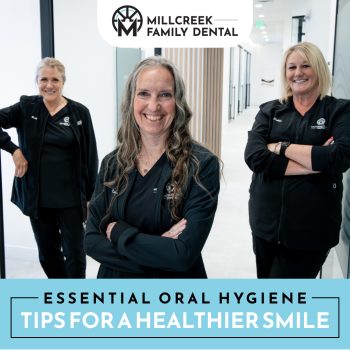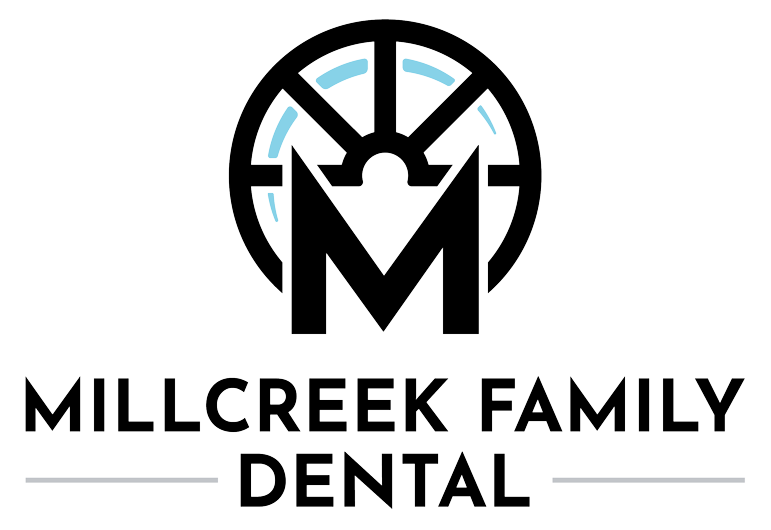Community
Essential Oral Hygiene Tips for a Healthier Smile
 A bright, healthy smile is more than just an aesthetic asset—it’s a reflection of your overall health. Maintaining good oral hygiene helps prevent cavities, gum disease, and bad breath, while also reducing your risk for more serious health conditions like heart disease and diabetes. At Millcreek Family Dental in Bountiful, we believe that a proactive approach to oral care can keep your smile strong for years to come.
A bright, healthy smile is more than just an aesthetic asset—it’s a reflection of your overall health. Maintaining good oral hygiene helps prevent cavities, gum disease, and bad breath, while also reducing your risk for more serious health conditions like heart disease and diabetes. At Millcreek Family Dental in Bountiful, we believe that a proactive approach to oral care can keep your smile strong for years to come.
Why Good Oral Hygiene Matters
Oral health is closely connected to overall well-being. Poor oral hygiene can lead to plaque buildup, gum disease, and tooth decay, but the effects don’t stop there. Studies show that bacteria from untreated gum infections can enter the bloodstream, increasing the risk of cardiovascular disease, respiratory infections, and even complications for diabetics.
By practicing good oral hygiene daily, you can:
- Prevent cavities and gum disease
- Maintain fresh breath
- Protect your overall health
- Save money by avoiding costly dental procedures
Daily Habits for Maintaining a Healthy Smile
A strong oral hygiene routine is the foundation of a healthy smile. Here’s what you should be doing every day:
Proper Brushing Techniques: Are You Doing It Right?
Many people brush their teeth daily but don’t do it correctly. Follow these tips to get the most out of your brushing routine:
- Use a soft-bristled toothbrush and fluoride toothpaste.
- Brush for at least two minutes, twice a day.
- Use small, circular motions to clean all tooth surfaces.
- Don’t forget your tongue! Bacteria can collect there and cause bad breath.
- Replace your toothbrush every 3-4 months or sooner if the bristles are frayed.
Flossing: The Often Overlooked Essential Step
Flossing is just as important as brushing, yet only 30% of Americans floss daily. Flossing removes food particles and plaque from between teeth, where a toothbrush can’t reach.
- Floss once a day before brushing to dislodge debris.
- Use about 18 inches of floss, wrapping most around your fingers and using a clean section for each tooth.
- Gently guide the floss between teeth and curve it into a “C” shape against the tooth.
The Role of Mouthwash in Your Routine
Mouthwash isn’t a substitute for brushing and flossing, but it can be an excellent addition to your routine.
- Antibacterial mouthwashes help kill germs and reduce plaque buildup.
- Fluoride mouthwashes strengthen enamel and prevent cavities.
- Alcohol-free options are ideal for those with sensitive gums.
Diet and Oral Health: Foods That Help (and Hurt) Your Teeth
What you eat plays a huge role in oral health. Some foods can strengthen enamel and prevent decay, while others promote cavities and gum disease.
Tooth-Friendly Foods:
- Dairy Products (milk, cheese, yogurt) – Strengthen enamel with calcium.
- Crunchy Fruits & Vegetables (apples, carrots, celery) – Naturally clean teeth.
- Nuts & Seeds – Contain essential minerals for strong teeth.
- Water – Helps rinse away food particles and bacteria.
Foods to Avoid:
- Sugary Snacks & Drinks (candy, soda, sports drinks) – Feed harmful bacteria that cause decay.
- Acidic Foods & Beverages (citrus, coffee, wine) – Weaken enamel over time.
- Sticky or Chewy Treats (dried fruit, caramel) – Get stuck in teeth and promote plaque buildup.
Professional Dental Cleanings: How Often Should You Go?
Even with a perfect oral hygiene routine, plaque can harden into tartar, which only a professional cleaning can remove. That’s why regular checkups at Millcreek Family Dental are essential.
- Most patients should visit the dentist every six months for a cleaning and exam.
- Patients with gum disease may need more frequent visits.
- Routine cleanings help detect issues early, saving you time and money in the long run.
Common Oral Hygiene Mistakes to Avoid
- Brushing too hard can wear down enamel and cause gum recession.
- Skipping flossing leads to plaque buildup and gum disease.
- Using an old toothbrush doesn’t clean teeth effectively.
- Rinsing immediately after brushing can wash away fluoride before it has time to strengthen enamel.
- Ignoring dental visits can turn small problems into big (and expensive) ones!
How Millcreek Family Dental Supports Your Oral Health
At Millcreek Family Dental, we go beyond just fixing dental problems—we help you prevent them. Our approach to oral care includes:
- Comprehensive cleanings & exams to detect issues early.
- Personalized oral hygiene education to improve your routine.
- Fluoride treatments & dental sealants for added cavity protection.
- A friendly, positive environment to make every visit comfortable.
Take Control of Your Oral Health Today!
Your smile deserves the best care possible, and that starts with good oral hygiene habits and regular dental visits. Whether you need a routine checkup, a deep cleaning, or expert advice, Millcreek Family Dental is here to help.
Contact Millcreek Family Dental today for expert and comprehensive dental care!
Disclaimer: The content of this blog is not intended to be a substitute for professional medical advice, diagnosis, or treatment. Always seek the advice of qualified health providers with questions you may have regarding medical conditions.
